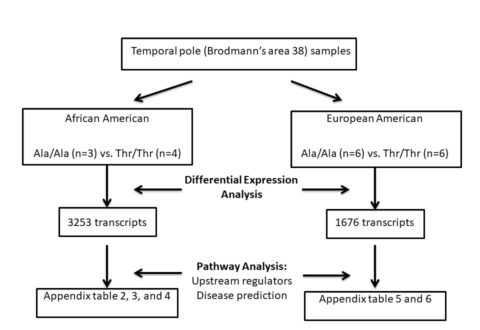CONTEXT:
A single nucleotide polymorphism in DIO2, Thr92AlaD2, has been associated with a transcriptome typically found in neurodegenerative diseases in postmortem human brain tissue.
OBJECTIVE:
To determine whether Thr92AlaD2 is associated with incident Alzheimer’s disease (AD).
DESIGN:
Population-based study; human brain tissue microarray.
SETTING:
Community-based cohorts from Chicago, Illinois and northeastern Illinois, as well as religious clergymen from across the U.S. made up the primary population. A representative sample of the U.S. population was used for secondary analyses.
PARTICIPANTS:
3054 African (AA) and 9304 European Americans (EA).
MAIN OUTCOME MEASURE:
Incident AD.
RESULTS:
In the primary population, AAs with Thr92AlaD2 had 1.3 times (95% CI, 1.02 to 1.68; P=0.048) higher odds of developing AD. AAs from a second population with Thr92AlaD2 had a trend towards increased odds of dementia (odds ratio (OR) 1.33; 95% CI, 0.99 to 1.78; P=0.06); they also exhibited 1.35 times higher odds of developing cognitive impairment not demented (CIND, 95% CI, 1.09 to 1.67; P=0.006). Meta-analysis showed that AAs with Thr92AlaD2 had 1.3 times increased odds of developing AD/dementia (95% CI, 1.07 to 1.58; P=0.008). In EAs there was no association between Thr92AlaD2 and AD, dementia, or CIND. Microarray of AA brain tissue identified transcriptional patterns linked to AD pathogenesis.
CONCLUSIONS:
Thr92AlaD2 is associated with molecular markers known to underlie AD pathogenesis in AAs; this translates to an observed phenotype of increased odds of developing AD/dementia in AAs in these populations. Thr92AlaD2 may represent one factor contributing to racial discrepancies in incident AD.
A Common DIO2 Polymorphism And Alzheimer’s Disease Dementia in African And European Americans.
McAninch EA, Rajan KB, Evans DA, Jo S, Chaker L, Peeters RP, Bennett DA, Mash DC, Bianco AC. J Clin Endocrinol Metab. 2018 PMID: 29481662
